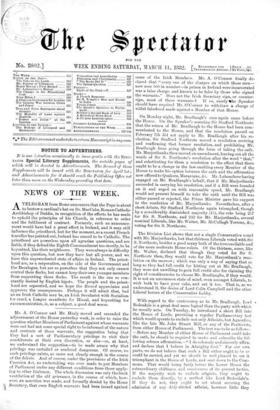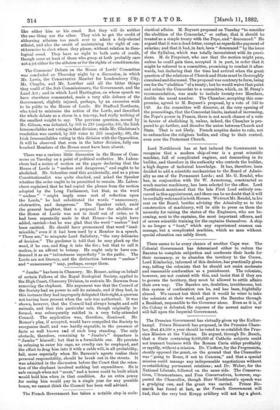With regard to the controversy as to Mr. Bradlaugh, Lord
Redesdale is a great deal more logical than the party with which he usually acts. On Tuesday, he introduced a short Bill into the House of Lords, providing a regular Parliamentary test which would operate to exclude not only Atheists, but Agnostics, like the late Mr. John Stuart Mill, or any of the Positivists, from either House of Parliament. The test was to be as follows : —Before any Member of either House of Parliament could take the oath, he should be required to make and subscribe the fol- lowing solemn affirmation,—" I do solemnly and sincerely affirm and declare that I believe in Almighty God." For our own parts, we do not believe that such a Bill either ought to be or could be carried, and yet we should be well pleased to see it triumphant in the House of Lords, and sent down to the Com- mons. That would bring fairly before the Lower House the extraordinary shiftiness and evasiveness of its present tactics. If the majority wish to exclude atheists, they ought to exclude them directly, by a method like Lord Redesdale's. If they do not, they ought to set about securing the admission of any duly.elected atheist, however little they like either him or his creed. But they will do neither the one thing nor the other. They wish to get the credit of abhorring atheism too much ever to admit a duly-elected atheist, and also the credit of maintaining the right of con- stituencies to elect whom they please, without relation to theo- logical creed. They have no right to both sorts of credit, though some at least of those who grasp at both probably care not a jot either for the atheism or for the rights of constituencies.



































